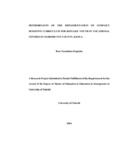| dc.description.abstract | The study is based on basis that education is two faced; it can have both positive and negative impact on a society. Historically, education has triggered and fuelled conflict in various countries. Different educational factors that have fuelled conflict are discussed. This study investigated the determinants of the implementation of a conflict-sensitive curriculum for refugee youth in vocational centres in, Nairobi City County. The objectives of the study were: to establish conflict sensitive curriculum has been implemented for the refugee youth in the vocational centres in Nairobi, teachers‟ competencies influences the implementation of conflict sensitive curriculum, to examine the extent to which teachers‟ methodologies determines the implementation of conflict sensitive curriculum and to determine the refugees students‟ attitudes towards the implementation of a conflict sensitive curriculum in the vocational centres in Nairobi. The study adopted The Ecological Theory of Human Development that theorises child development considers the entire ecological system because a conflict sensitive curriculum incorporates all systems that child is in. Participants were selected using census and simple random sampling and the study sampled one key informant, 2 directors, 32 teachers and 52 refugee students. Descriptive statistics were used for data analysis and results presented using tables, pie chart and frequencies. Based on the findings, the study concluded that to a large extent, the conflict sensitive curriculum has been implemented the vocational centres; conflict resolution, human rights, peace education, psychosocial support and work-readiness skills are implemented and the teachers have some knowledge on the these competencies. They integrated and used them frequently in the lessons. The teachers mostly used learners‟ approaches as a teaching methodology. All the subject offered are relevant to the urban economy and the students‟ attitudes are positive towards the vocational offered. The study recommends that the sponsors and the government should create production units to improve on employability, provide the graduates with starter kits such as mechanic toolbox or sewing machines in respect to the courses they are doing. They should increase forums with the sponsors and the students to inspire them more and influence their attitude positively. Moreover, there should be more in-service training to the teachers to ensure that the teachers are trained on the conflict sensitive curriculum. The suggestions for further studies on determinants of the implementation of a conflict-sensitive curriculum for refugee youth in educational institutions in | en_US |

